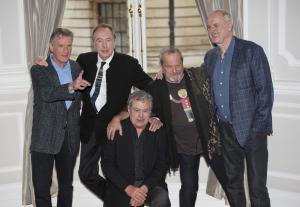In today’s Wall Street Journal I report on Chicago Shakespeare’s new production of The Merry Wives of Windsor. Here’s an excerpt.
* * *
What is so lovely and life-giving about Barbara Gaines’ Chicago Shakespeare production of “Merry Wives,” in which the play is reset in England shortly after World War II, is that the good humor seems to roll off the stage in great, generous waves of joy. The lights come up on the main street of Windsor, snow starts to fall and the stage fills with genial souls (and an equally genial dog, one of three in the cast). The war being over, everybody strikes up a chorus of “Ac-Cent-Tchu-ate the Positive,” and you can all but hear the audience going “Ooooh!” Nor is there anything manipulative about the creation of that collective pleasure, which lasts the whole night long. That “ooooh” is the sound of a fallen world being made whole.
 “The Merry Wives of Windsor” cries out for music, so much so that it’s been turned into three different operas, and Ms. Gaines and Doug Peck, her musical director, oblige by filling the evening with period pop songs that are sung by the members of the cast–sometimes well, sometimes less so, but always to precise emotional effect. How ingenious and telling it is for Mistresses Ford and Page (Heidi Kettenring and Kelli Fox) to plot their tormentor’s comeuppance while singing “The Gentleman Is a Dope” in the kitchen, or for Sir John (Scott Jaeck) to be serenaded with a rousing chorus of “Too Fat Polka”! The object, as Ms. Gaines explains in her program note, is to portray “a society that is trying to separate itself from the horrors of war and rebuild itself. Hope and optimism are in the air–and the music of the period reflects that.” That it does, irresistibly.
“The Merry Wives of Windsor” cries out for music, so much so that it’s been turned into three different operas, and Ms. Gaines and Doug Peck, her musical director, oblige by filling the evening with period pop songs that are sung by the members of the cast–sometimes well, sometimes less so, but always to precise emotional effect. How ingenious and telling it is for Mistresses Ford and Page (Heidi Kettenring and Kelli Fox) to plot their tormentor’s comeuppance while singing “The Gentleman Is a Dope” in the kitchen, or for Sir John (Scott Jaeck) to be serenaded with a rousing chorus of “Too Fat Polka”! The object, as Ms. Gaines explains in her program note, is to portray “a society that is trying to separate itself from the horrors of war and rebuild itself. Hope and optimism are in the air–and the music of the period reflects that.” That it does, irresistibly.
Mr. Jaeck gives us a blimp-like Falstaff whose own fantasies of irresistibility are magnificently ludicrous. I wish he were less prone to encrust his lines with chortles and chuckles–he’d be funnier if he pruned away at least two-thirds of them–and I also wish that the big-city accent of Matt Mueller, who plays Fenton as a visiting American soldier, were more specific. Beyond that, I haven’t a single complaint, and for Ms. Kettenring and Ms. Fox I have nothing but praise. They are correctly portrayed as wised-up, hip-flask-toting women of a certain age in whom the gleeful spark of carnal mischief is far from dead, and you’ll share the relish with which they turn the tables on Sir John….
* * *
Read the whole thing here.
The trailer for Merry Wives:
Archives for January 3, 2014
TT: It’s all about us
In today’s Wall Street Journal “Sightings” column I sound off testily on boomer nostalgia. Here’s an excerpt.
* * *
When the surviving members of the cast of “Monty Python’s Flying Circus,” which originally ran on the BBC between 1969 and 1974, announced plans to give their first public performances as a group since 1982, tickets for the opening-night show sold out in 43.5 seconds. It’s not known whether the comedians will be doing any new material, but I doubt it. That’s not why people come to this kind of event, after all. They come for much the same reason that they came to Broadway in 2005 to see Eric Idle’s musical stage version of “Spamalot”: to applaud their lost youth. Hence they don’t want to see anything new, though they’ll put up with it if absolutely necessary.
 Most “Monty Python” fans are, of course, baby boomers, who have long been a nostalgic lot and are growing more so as they totter toward old age. Witness their tiresomely obsessive fascination with the popular television series of their youth. Likewise their undimmed passion for the rock music of the ’60s and ’70s, which they still love so much that they’ll buy expensive tickets to see wrinkled old codgers play it onstage.
Most “Monty Python” fans are, of course, baby boomers, who have long been a nostalgic lot and are growing more so as they totter toward old age. Witness their tiresomely obsessive fascination with the popular television series of their youth. Likewise their undimmed passion for the rock music of the ’60s and ’70s, which they still love so much that they’ll buy expensive tickets to see wrinkled old codgers play it onstage.
As always with the boomers, this nostalgia contains more than a touch of narcissism. The same narcissism was on display in many of the countless gushy boomer-penned reminiscences occasioned by the fiftieth anniversary of the Kennedy assassination. An indisputably major historical event, to be sure, but there was also something decidedly creepy about the self-centered tone of those suddenly-my-world-changed pieces, which was deftly skewered by this Onion headline: “Area Man Can Remember Exactly Where He Was, What He Was Doing When He Assassinated John F. Kennedy.” Like everything else in the boomers’ world, Kennedy’s death turned out in the end to have been all about them.
I am, as it happens, a baby boomer, but not one who feels any broad-gauge nostalgia for the ’60s and ’70s. My attitude resembles that of my parents, who were born in the ’20s and lived through the Great Depression and World War II. Both of them felt nostalgic about certain aspects of the culture of the ’30s and ’40s, but they never wallowed in it. Theirs was, you might say, a matter-of-fact nostalgia: They’d had too tough a time to feel any other way about their youth….
* * *
Read the whole thing here.
TT: Almanac
“They must hunger in frost that will not work in heat.”
John Heywood, Proverbs
